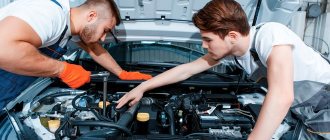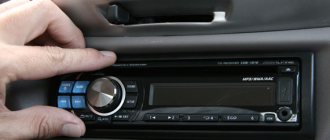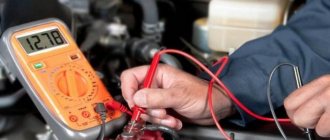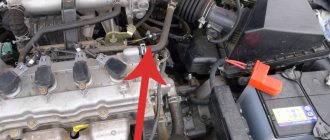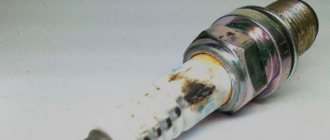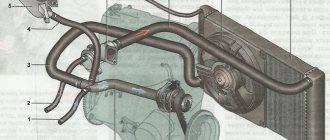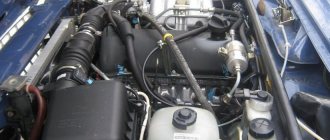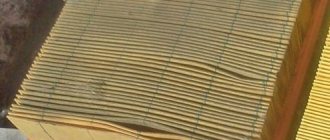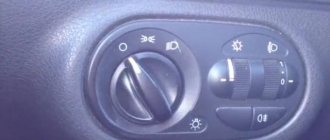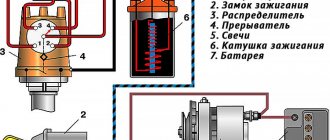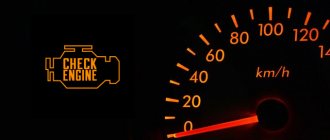If when you turn the ignition key you only hear a loud crash from the engine compartment, do not rush to immediately blame the starter for all your troubles. There may be several reasons for this phenomenon, and a breakdown of the starter retractor relay is just one of the most common malfunctions. Today we will talk about why the starter began to crack and what to do to restore its functionality.
Why the starter cracks: finding and eliminating the cause
If when you turn the ignition key you only hear a loud crash from the engine compartment, do not rush to immediately blame the starter for all your troubles. There may be several reasons for this phenomenon, and a breakdown of the starter retractor relay is just one of the most common malfunctions. Today we will talk about why the starter began to crack and what to do to restore its functionality.
Checking the starter
First of all, without having certain skills and abilities, it is better to contact a service station, where experienced specialists will determine exactly what caused the starter to fail.
The initial check of the starter is carried out by measuring the voltage in the wire going to the control contact of the solenoid relay when turning the car's ignition key. In operating condition, the voltage should be 12 - 24 Volts (depending on the type of vehicle when testing the starter of a car or truck). The neutral position of the ignition key in the lock means that the voltage on the solenoid relay control wire should disappear.
This happens when the Bendix gears wear out or the flywheel teeth wear out. This problem can only be solved by replacing the bendix or flywheel assembly. If the solenoid relay, gear and overrunning clutch (Bendix), as well as the flywheel and combustion lock are all fine, but the problem remains, then the starter must be removed for repair or replacement.
Causes of malfunction
Before we begin to study the causes of the malfunction, we remind you that hereinafter we are talking about the crackling noise of the starter, which is most similar to the loud rattling of the contacts of an electromagnetic relay. If you hear an unpleasant metallic grinding noise from under the hood, then it appears due to poor engagement of the overrunning clutch (starter Bendix) with the flywheel teeth - that’s a completely different story.
Most often, the starter crackles when you turn the ignition key for three reasons:
Low battery
To understand the cause of the crackling noise due to a discharged battery, let's remember the starter device. When you turn the ignition key, the voltage from the on-board network is supplied to the coil of its solenoid relay. The electromagnetic forces that appear in this case cause the armature of the device to move. It closes the power contacts that connect the starter motor to the battery, and in addition, causes the Bendix gear to engage with the flywheel.
When the battery is discharged, its energy may be enough to attract the metal core - cranking the crankshaft is out of the question. As soon as the starter contacts close and power is supplied to its electric motor, the voltage drops to such an extent that the electromagnet is unable to hold the metal core. Under the action of the return spring, it tends to take its original position and opens the power contacts. The restored voltage contributes to the repeated retraction of the anchor, and the situation is recreated many times.
To make sure that the culprit of the problem is a deep discharge of the battery, just turn on several consumers (lighting, electric heater motor, etc.) and press the sound signal. The latter will either not turn on at all, or will be heard with wheezing, reduced amplitude or attenuation.
Poor engine ground contact
The picture of what is happening is practically indistinguishable from the case discussed above, with the only difference that the test for battery discharge ends with a negative result - all consumers, including the sound signal, are working at full strength.
At the same time, it is very simple to determine that the cause of the malfunction is poor contact between the battery and the engine - just pay attention to the oil pressure warning lamp, which is located on the instrument panel. If the voltage in the car’s on-board network is below normal, then turning the ignition switch to the “Start” position will lead to a gradual attenuation of the brightness of the warning lamp (like all others).
In the case where the cause of the crackling sound of the starter solenoid relay is a bad ground, an attempt to start the engine will lead to its complete extinction in time with the clicks of the solenoid relay. At the same time, other indicators practically do not change the intensity of the glow.
Everything is explained very simply - the “mass” of the oil pressure sensor, as well as the starter, is the housing. Therefore, as soon as the electrical contact between the engine and the battery is lost, both of these devices stop working synchronously.
Open or shorted starter relay winding
Another reason why the solenoid relay cracks is an interturn short circuit or a break in its holding winding. In other words, the efforts of the electromagnet become insufficient to keep the power contacts of the starter relay in the closed state and engage the overrunning clutch gear with the flywheel ring gear. Under the action of the return spring, the bendix tends to take its original position, and the contact pad located on the armature opens the electrical connection. After this, the retractor winding turns on again and the situation repeats itself many times, which causes the crackling noise.
to determine that in this case the starter solenoid relay has failed by the behavior of the warning lamps located on the instrument panel. At the moment when the loud clicks of the starter are heard, their brightness does not change - the switching of the starter motor occurs for such a short time that the battery voltage practically does not drop.
Something else useful for you:
Other signs of a Bendix malfunction
The starter is very susceptible to harmful environmental factors - moisture, dust, dirt, oil. Consequently, his isolation is broken and he refuses to work. It is necessary to remember that the part works in conjunction with other elements and is subject to “avalanche failures”, when a malfunction in one unit entails a breakdown in others. Other reasons that can cause starter failure include:
- wear of the relay winding - the starter shows no signs of life at all, the armature does not turn;
- wear of the stator or armature winding - the starter rotates the motor extremely slowly, while the crankshaft also rotates slowly;
- problems with the manifold - slow cranking of the engine and crankshaft;
- brush wear - no current is supplied to the relay, the starter does not make noise.
You may notice that the same symptoms indicate different problems. You can carry out the diagnosis yourself, but in order not to aggravate the situation, you should still turn to professionals.
If you discover certain problems in the functioning of the starter, do not delay solving the problem. Such a malfunction can lead to the failure of more serious components of the overall mechanism. It is better to carry out minimal repairs than major ones.
How to fix a rattling starter
The method for troubleshooting depends on what is causing the problem. If the starter cannot work normally due to a discharged battery, it is enough to charge it to the required parameters. Typically, charging is carried out with a current of 0.1C, where C is the battery capacity in ampere-hours. At the same time, highly discharged current sources and calcium batteries should be charged with low currents (1-2 A) to at least 25% charge (this parameter is controlled by the density of the electrolyte). The gentle mode will take more time, but will protect the battery from many negative aspects.
Note! Often, when the battery is discharged, car owners try to start the engine “from a tow”. Note that this method is only suitable for the simplest power units, but not for injection engines. Launching the latter “from the pusher” often leads to a failure of the electronic control unit software.
In this case, the ECU begins to behave unpredictably - for example, request permission to start from a disabled immobilizer. The situation can only be corrected by reflashing the “brains”, and this, as you yourself understand, is an additional and completely unjustified expense.
In the case where the cracking of the solenoid relay occurs due to poor contact with the vehicle ground, it is enough to simply restore the electrical connection. To avoid problems in the future, it is recommended to remove the tire that connects the engine to the body and clean the contact pads with sandpaper. A thin layer of technical Vaseline or VD-40 universal lubricant will help prevent their oxidation.
If the source of the malfunction is the retaining winding of the starter solenoid relay, then try to repair it. If this is not possible, then a decision is made to replace the solenoid relay assembly. As you can see, even a novice driver can cope with finding the fault that is causing the starter to crack.
Video: Why the starter cracks. Useful advice from an auto electrician.
Source
Methods for emergency engine starting if the starter does not work
If the starter does not show any signs of life - it does not click or make any sounds at all - you can start the engine directly. Not the best method, but suitable in an emergency situation when you urgently need to start the car.
Let's consider the algorithm of actions for starting the engine directly using the example of the popular Lada "Ten" (VAZ-2110). You need:
- Put the car in "handbrake" and set the gear to neutral.
- Turn the key to turn on the ignition.
- Open the hood - further work will take place in the engine compartment.
- Remove the air filter from the driver's seat to gain access to the starter contacts.
- Disconnect the chip that goes to the contact group.
- Using a metal object, you need to short-circuit the starter terminals. For example, a screwdriver or a piece of wire is suitable for this.
If other components are working properly and the battery is sufficiently charged, these simple manipulations will start the car. Replace the air filter and the chip leading to the contact group.
It's funny that after starting directly, the engine, as a rule, will continue to be started simply with the ignition key. But this does not mean that the problem is solved. The breakdown cannot be done anywhere and you need to identify it and fix it.
The starter makes a crunching noise when you start it
- To the beginning of the forum
- Forum Rules
- Old design
- FAQ
- Search
- Users
I'm wondering what it could be. 21124, 1.6 16cl. mileage 51 thousand km.
When starting (and the colder the machine, the more noticeable) a grinding noise (or even a crunching sound) is heard. The sound is similar... well, as if something is rotating without lubrication.. As long as the key is in the “starter” position, there is no grinding noise, the engine begins to seize (“ I turn off the starter) and while the engine is spinning up immediately after starting and picking up speed, this grinding noise appears. lasts 1-2 seconds.. and disappears.. when the glitch is “hot” it is less noticeable.. or not at all or shorter term..
I suspect the starter. it's like I'm turning it off too late
— a kind of twisting of an engine that has already been started.. but how to check that it is he? and what in him can manifest itself this way? (although it starts fine)
It also feels like the rotation of a dry bearing of some kind... and then with scrolling - the lubricant disperses and the grinding noise goes away. But this is most likely not the case - after all, for example, when restarting immediately after the previous one, there is also a grinding noise...
In general, if anyone has encountered something similar or has any other ideas, please let me know, I’ll be grateful
